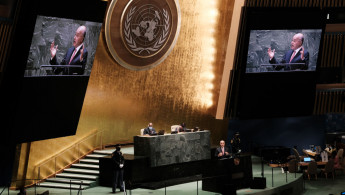UN human rights council condemns Algeria for 'overbroad' terrorism law to prosecute activists
Algeria's regime has come under attack from world-leading powers at the Human Rights Council (HRC) for prosecuting activists and journalists under an "overbroad" terrorism law.
On Friday, 11 November, the US, the United Kingdom and Germany lambasted the North African state during the UN's Universal Periodic Review (UPR) over its deteriorating human rights.
The US representative asked Algiers to repeal the amendments to Article 87b of the Penal Code, which "contain an overly broad definition of terrorism," and to release "journalists, human rights defenders and those detained under this provision."
There are some 250 prisoners of conscience in the country, many of them charged with terrorism for criticising politicians or supporting online anti-regime protests.
In June 2021, President Tebboune expanded Algeria's already overbroad definition of "terrorism" in article 87 of the penal code to include "to work for or to incite by any means, to accede to power or change the system of governance by non-constitutional means" and to "harm the integrity of national territory or to incite doing so, by any means."
The authorities have since used this article to prosecute an increasing number of activists, journalists, and human rights defenders.
The United Kingdom and Germany called on Algeria to guarantee freedom of expression and end discrimination against women and " to stop harassing journalists and human rights defenders and withdraw accusations of undermining national unity."
Meanwhile, France has merely invited Algeria to sign international protocols, particularly those relating to domestic violence.
In September, the visit of the UN Special Rapporteur on the Rights to Freedom of Peaceful Assembly and of Association was postponed to 2023 at the request of the Algerian government.
This was the eighth postponement of this visit since 2011.
Also, Kaddour Chouicha and Jamila Loukil, both members of the Algerian League for the Defense of Human Rights (LADDH), were detained by border police as they were about to board a plane in Oran in August.
Jamila Loukil was scheduled to speak in Geneva at a preparatory session for the November review of Algeria.
"We are at a tipping point, the dictatorship is taking hold more and more in Algeria. Before [the Hirak] there was no independence, but it was less bad than now," Farid Dms Debah, the founder of the Citizen Movement for Algeria, told The New Arab.
"Apart from expressing yourself anonymously, today nothing is possible in Algeria," added the Paris-based activist.
In 2019, Algerians toppled the two-decade-long-regime of Bouteflika, envisioning a future where the criticism of politicians would not be censored. The Algerian path to democracy was soon sabotaged by a new regime under current president Abdelmadjid Tebboune.





 Follow the Middle East's top stories in English at The New Arab on Google News
Follow the Middle East's top stories in English at The New Arab on Google News


